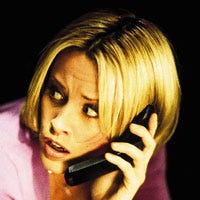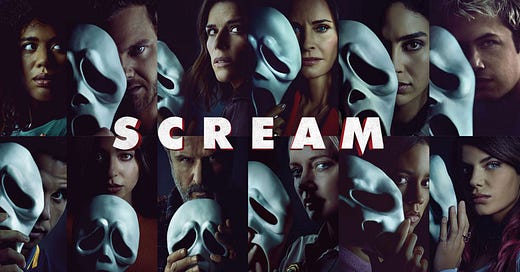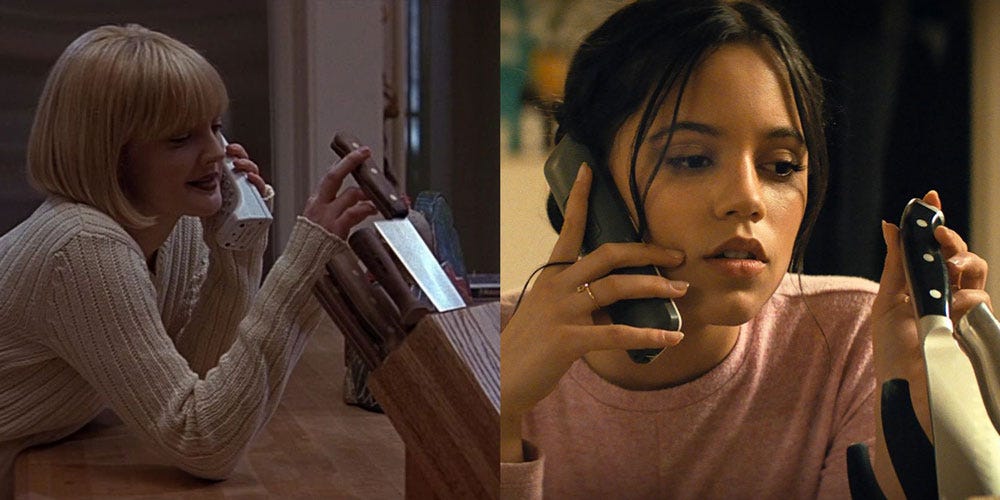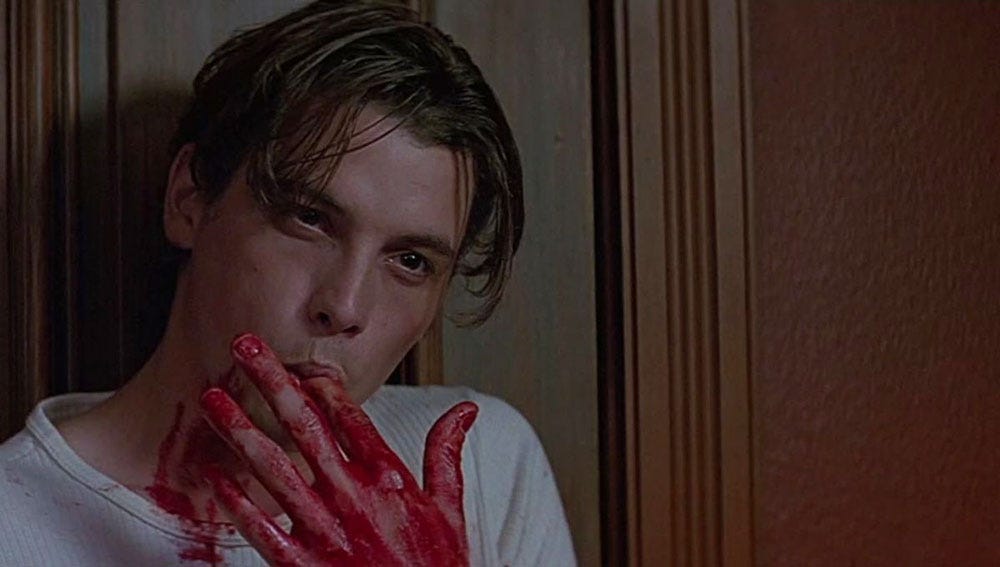This article was originally published on the Pop Warrior blog 22/1/2022
Scream
Released: 14th January 2022
Written by: James Vanderbilt, Guy Busick
Directed by: Matt Bettinelli-Olpin, Tyler Gillett
**Spoiler warning: contains spoilers for all five Scream films**
A “requel” 10 years in the making, the fifth instalment in the Scream franchise almost never happened owing to Scream 4‘s under-performance at the box office, and later on the brand’s deflection to a TV series – at best, a superficial incarnation in name only (and, it must be said, quite shit). Thanks to a new production company, Scream returned to the big screen this year with Final Girl Royalty, Neve Campbell, and her surviving character counterparts reprising their roles.
When it was officially confirmed that a fourth sequel was in development and it would include the core original cast, I was excited, and had high hopes. Unlike other horror franchises famous for churning out sub-par sequels which oftentimes were happy to capitalise on brand recognition but only have a bare bone (if any) connection to the original characters, Scream was able to maintain a level of consistency and quality with every subsequent iteration that elevated them above gratuitous cash grab status where they could really stand alone on their own merits. Admittedly, though the thought of being able to envision a worthwhile continuation of the story becomes less likely with each new film, I was confident it could be pulled off due to the strength of its history.
Notably, this would be the first film in the franchise without the involvement of director Wes Craven, and once production was under way both the cast and new directing team were vocal in quashing any doubts this might raise.
I don’t think audiences are going to be disappointed. These guys were so committed to doing it right. I think Wes would be very proud.
Neve Campbell
It’s the attention to scares, attention to characters, the emotion… [Wes] was there in spirit on-set all the time.
Matt Bettinelli-Olpin, Director
All very encouraging, but with that in mind I tried to set realistic expectations for myself i.e. chances are it won’t be better than any of the films before it, but nevertheless has the ingredients to be an enjoyable and worthy addition to the series. Difficult as it was, I avoided any official news and promotion for the film (even the trailer) leading up to its release, because frankly I get the gist by now: Ghostface, young pretty people cut up, “Hello, Sidney”, movie sequel rules, meta meta meta, etc. so I was quite happy to just wait and see everything with totally fresh eyes. Early reviews were almost unanimously gushing with praise, and I cautiously allowed this to raise my expectations.
My overall experience watching the film, I’m sad to say, was disappointing. The one lukewarm comment I’d seen prior described it as “fine, but ultimately unnecessary” which stuck in my mind because all the exclusively positive hype seemed almost too good to be true, and unfortunately it turned out to be right on the money.
In short, I had a feeling throughout that I was waiting for a “wow” moment to blow me away, or make me realise how this film was going to carve its own unique mark in the franchise just as the other three sequels had achieved so successfully, and that never came. The tone of the film also felt disconnected from the first four, something Scream 4 even managed to avoid despite being made a decade after its predecessor, and I think that’s a testament to how Craven’s absence had a palpable effect on the final product.
Here’s what I think they got wrong (and almost right)…
The opening scene
Ever since viewers saw Casey Becker meet her gory fate less than 15 minutes into the first film, the iconic opening scene kill instantly became a cornerstone of the franchise. More like a prologue, it would generally set off the chain of events that followed without being embedded into the overarching story itself.
Scream 2 stepped up the meta by introducing the Stab universe and having its first victims murdered against the backdrop of the previous film’s events retold on screen. Scream 3 was the first to kill off an existing character, Cotton Weary, and with the murder of his girlfriend also set up the story for Ghostface’s new multi-voice ability. Scream 4 appears at first to have gone more back to basics, but soon pans out to be a 3-for-the-price-of-1 film within a film within a film (*meta intensifies*).
With the latest outing, it seems like they intentionally wanted to go back to its roots and have strong parallels with the first film, given the similarities i.e. unknown young girl alone in her house receives strange call and violence ensues. My assumption is that they were going for something along the lines of “what would Casey Becker’s murder look like in 2022”, which on paper I’m not mad about. Whether or not that’s accurate, five films in we are comfortably familiar with the dynamic of Ghostface methodically taunting their prey before making their attack while the victim tries in vain to escape, so that formulaic chain of events on its own is not really enough. Furthermore, the cat-and-mouse game that played out with Casey’s murder was done so exquisitely it’s difficult to imagine how that could ever be bettered, and this unfortunately felt like a watered down rehash.
Of course there is a defining and important difference here, being that Tara not only survives the attack but also continues to have an important role in the film through to the end. I definitely wasn’t expecting that, and wish they would have made more of it. We don’t find this out until the next scene where her sister is informed of her attack, so on its own the opening scene still wholly feels like nothing we haven’t seen before. If Tara’s survival hinged on her ability to outsmart Ghostface rather than luck, and we were able to witness that as part of her story, I think that could have been the extra ingredient needed to make Casey Becker 2.0 really feel modern and fresh.
Star power
Another thing the franchise became known for with its sequels was the who’s who of supporting cast players, young Hollywood’s hot property of the time making the films feel just that extra bit more zeitgeisty.





Famously, Sarah Michelle Gellar who was then riding high on the success of Buffy the Vampire Slayer signed on to Scream 2 without reading the script or knowing what part she’d play.
This is another area where I found this film to be lacking, leaving the legacy cast to do most of the heavy lifting. Though most of the new young cast are definitely recognisable, they still feel more in the ‘up-and-coming’ stage of their celebrity status that don’t wield as much star power as others have in past sequels; if I’m honest, even the brief cameo appearances like Heather Graham and Tori Spelling were more exciting.
Having someone with that level of pop culture gravitas like a Zendaya, Florence Pugh, or Anya Taylor-Joy even in a small part would have made it feel like more of a current zeitgeist moment than just another sequel.
Legacy cast
Speaking of which, the legacy cast members are woefully underused for my liking. It seems about a good 30 minutes into the film before Sidney appears, and along with Gale and – to a similar but lesser extent – Dewey, is relegated to more of a secondary character for the remainder.
In Scream 4 there was a similar dynamic whereby a new group of younger characters was brought in to complement the existing cast, but it still felt like an even split overall when it came to screen time and plot development. Here, the even newer group noticeably take much more of the focus in those regards, and what that does is steer it more towards the direction of “unnecessary sequel”.
I think the biggest contribution to this was reorienting the narrative to have Sam, a brand new character, as the lead with Sidney being more like her shadow. We as the audience aren’t going to connect with her as strongly as we’ve been able to connect with Sidney over the course of four films, and in my opinion Melissa Barrera wasn’t able to fill Neve Campbell’s shoes and carry the film as far as performance goes.
Billy Loomis returns
Like Tara’s survival in the opening scene, this was another aspect of the film which I thought made it feel fresh and only wish they would have leaned into it more. A big theme running throughout all the sequels is how the past comes back to haunt the present, so having the (or at least an) original Ghostface killer return is perfectly in keeping with that, but still something we haven’t seen before.
When we see him for the first time through Sam’s hallucination, I initially presumed it would be a one-off appearance from him like other cameos we’ve come to expect. As the hallucinations continued sporadically throughout the film, I began to wonder increasingly what purpose this served to the plot, if any. Providing Sam with the backstory to connect her to Sidney made sense, but the hallucinations seemed to do little except provoke extra psychological terror which only she experienced, and didn’t particularly compare to the real life terror of being actively hunted.
If Billy appeared in a more substantial capacity and the hallucinations affected her behaviour in the way that, for example, she struggled to deal with being the daughter of a serial killer, it had the potential to be one of the more interesting plot points. By the end of the film I was left feeling that the story as is wouldn’t have lost much without it, and may as well have just been a brief but knowing cameo.
Judy and Wes’ deaths
It was nice to see at least one more familiar face return (sidebar: Marley Shelton is looking GOOD!) even if it means we have to watch them die a grisly death. The murders of Judy and Wes seemed to only serve the purpose that the film needed some more bloodshed at that point to push the story along, and sometimes that’s ok. What I found odd was how their murders came one after the other without any real connection to each other, which is what I would have expected.
Judy leaves Wes at home following a brief discussion about personal safety, while en route Ghostface taunts her over the phone luring her back to a quick death. Wes, oblivious to his mother’s murder, unwittingly becomes the next victim after a more prolonged and tense face-off with the killer. Even if Wes had only discovered his mother’s body on the doorstep before being killed, that would have at least added a more emotional aspect to his death, but for some reason they were consecutive yet completely independent events which I think could have been more interestingly intertwined.
Killers revealed
The revelation of killers’ identities and their motive was – and this pains me to say – another underwhelming climax. This was really the film’s last chance to give me something memorable to take away from it, but it felt like a rehash of its own old tropes.
One thing the first film did so cleverly was to convince you of Billy’s innocence right at the last moment by having him stabbed and seemingly left for dead, making it all the more shocking when he is revealed as one of a team of killers. Certainly for the franchise, this flipped the whodunnit aspect from wondering who could have the most viable motive, to who can be eliminated definitively from suspicion. This can really only be ascertained if a) someone is attacked and it results in their unequivocal death, or b) someone is attacked when there is no one else around to see it.
Richie has “KILLER” figuratively tattooed on his forehead right from the start, even despite the red herring of his self-proclaimed indifference to the Stab franchise, and that never really goes away up until the point his guilt is revealed. It really surprised me that they didn’t make more of an effort to lull the audience away from that speculation, beyond making him quite a dull character, which if anything just made the revelation even more anticlimactic.
Prior to the third act blood bath, the group of teens spend a fair bit of time either speculating who among them could be the killer, or joking that they are the killer in a strangely cavalier fashion. Their collective apathy (relative to the situation) somewhat undermines any tension built by the very real impending danger they’re in, so the revelation that Amber is indeed one of the killers kind of falls flat. Whether it was an acting or directional choice, Mikey Madison’s performance as “killer Amber” comes across very much as an homage-cum-impersonation of Stu Macher, which again feels like a contrived attempt to draw parallels to the first film and completely at odds with her character.
As far as their motivation goes, the concept of extreme fandom completely makes sense in 2022, but in the context of the film it felt too much like a re-skin of Scream 4. In the first three films, the killers (or specifically, the mastermind behind their respective teams) are very clearly motivated by passionate and personal revenge, so an elaborate rationale beyond that isn’t really necessary. In Scream 4, Jill is motivated by a combination of jealousy and desire for fame, but also has a direct connection to Sidney; while a little more far-fetched (yes, even more than long lost half brother, Roman) the idea that someone could be motivated to don the Ghostface mask and terrorise Sidney outside the realm of pure revenge was a new idea then, and pulled off well. With Richie and Amber, as well as having no direct connection to Sidney, it comes across as too similar a story but maybe just in a different flavour.
At the start of the party scene I actually thought it might have been the twins, though this was quickly unravelled when Chad very soon becomes the next victim. Still, it would have made sense given their connection to Sidney via Uncle Randy, whose death also would have provided ample motivation, with Mindy’s love of the horror genre and Chad’s… brawn? Having a brother-sister dynamic with a pair of killers also would have been a new and interesting avenue to be explored.
Conclusion
As a massive fan of the franchise, it feels sacrilege to speak so negatively about its latest offering. As well as what I’ve already detailed above, to me it lacked a lot of the charm, humour, and campiness that made the original films so unique and timeless, and failed to bring anything substantially new to the table. The truth is, I don’t think its a bad film by any stretch, but it had the potential to be so much better which is why I hold it to a higher standard.
Watch the trailer
🗨️ Join the discussion
How did you rate Scream?
📖 Further reading
Scream’s worst mistake is neglecting its legacy characters
An article I found interesting which elaborates more on the presence of the legacy cast and how that affected the film’s outcome.







